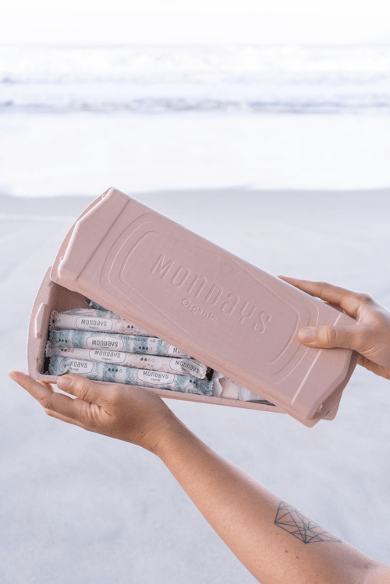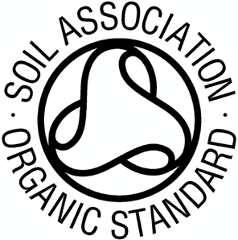Why go Organic this Organic September?
A City to Sea interview with Organic Mondays

It’s Organic September, a time to raise awareness about the positive impact of organic products and how we can all get involved!
What better way to celebrate than to catch up with Organic Mondays, one of our brilliant Plastic Free Period partners. We’ve put Nancy from Organic Mondays to the test so we can find out everything about going organic and why it’s better for the planet and our health.

JASMINE
Campaigns Manager, City to Sea
Jasmine: “Let’s start with the basics – when a product is certified organic, what exactly does that mean?”

Nancy
CEO & Co-founder, Organic Mondays
Disposable period products can contain cotton (though many don’t), but for both your health and that of the planet, if you can, make sure the cotton they contain is organic.”

Jasmine: What is it about organic cotton farming practices that make them better for the planet?
Nancy: There are 5 key ways organic cotton farming is better for the planet, it:
1. Reduces greenhouse gas emissions.
Therefore, organic farming methods means combatting climate change.
Non-organic cotton is one of the most pesticide and fertiliser intensive crops farmed today. The manufacture of pesticides themselves involves the burning of fossil fuels, which releases carbon dioxide into the atmosphere. Likewise, the excessive use of fertilisers cause direct emissions of nitrous oxide (a greenhouse gas) into the atmosphere.
By farming organically (without using pesticides and fertilisers), greenhouse gas emissions are massively reduced. Research suggests that if all farming was organic, pesticide use would drop by 98%.
2. Reduces carbon emissions.
Organic farming helps maintain the Earth’s critical carbon pools.
Soil is the planet’s second largest active pool of carbon (after the oceans) and organic farming help not only maintain but also increase the amount of carbon held in the ground.
The biological diversity of organically farmed soil results in it being up to 25% more effective at storing carbon in the longterm.
3. Reduces water consumption.
Water consumption in farming organic cotton is 90% lower than that of farming non-organic cotton.
Cotton is the thirstiest of the common agricultural crops. With water scarcity identified by the World Economic Forum as one of the top ten global risks to society over the next ten years, reducing the water consumption of cotton farming is vital to our future.
Organic cotton farmers save water by:
- harvesting rainwater, to water their crops.
- Selecting crop varieties that are drought resistant.
- And increasing the amount of organic matter in their soil. Research shows that soil with high organic content can hold up to 30% more water.
4. Reduces water pollution.
Organic farming protects the life of our waterways.
Nitrates and toxic chemicals are leached into our waterways when non-organic cotton is grown. This is because of the excessive use of man-made fertilisers combined with the high volumes of water needed for irrigation. Nitrogen pollution can cause ocean dead zones, which kill fish and other aquatic life. The toxic chemicals poison our rivers, oceans and seas, killing plants and wildlife far from the crop fields. Organic standards ban the use of these manufactured fertilisers.
5. Reduces energy consumption.
Organic farmers conserve energy and can thus help slow global warming.
Irrigation can account for up to an incredible 75% of all direct energy consumption in non-organic cotton farming. When you farm organically, you need a lot less water so you use significantly less energy.
A huge amount of energy is used in the manufacture of the pesticides and fertilisers used in conventional cotton farming. You cannot use man-made fertilisers when farming organically, so growing organic cotton uses significantly less indirect energy.

Pesticides are chemicals designed to kill insects (insecticides), weeds (herbicides) and fungal diseases (fungicides). They are routinely and repeatedly sprayed on the crops causing huge collateral damage.
Unless the cotton you are using is organic, it has been grown using vast amounts of toxic chemicals.

A direct danger to the farmers and their families: Pesticides used in conventional cotton farming, poisons farmers and their families; organic cotton farming protects the health of an estimated 100 million rural cotton farming families across the globe.
A danger to the people who rely for food on wildlife and crops that have been exposed to the chemicals: Indirect exposure to pesticides can lead to the creation of cancer cells and disruption of the endocrine system; buying organic cotton protects your own health from the exposure to a cocktail of residual chemicals.
Research shows that exposure to pesticide cocktails (a combination of multiple pesticides) can lead to the creation of cancer cells and disruption of the endocrine system which is responsible for regulating your metabolism, growth and development, tissue function, sexual function, and reproduction, among other things.
Organically grown and produced products do not contain any allergenic, carcinogenic or toxic chemical residues.
An unregulated risk to us, using the end products: Buying organic products that are used in or close to the body (like period products) means you know what you’re exposing your body to.
The processing and manufacture of certified organic products is subject to strict controls. An organic certification from ICEA for example (GOTs) or Soil Association means that anything used or added during the processing and manufacturing of the end product, such as dyes and inks, comply with extremely strict biodegradability and toxicity requirements.

In the meantime, if you want to know what’s in your products, opt for 100% organic cotton!

You can take it a step further by seeking out products with paper packaging and – if you use tampon applicators – then a cardboard applicator.
Organic Mondays products are organic AND 100% plastic-free; that means that the products AND the packaging are plastic-free. Organic Mondays tampons are wrapped in paper and our pads and pantyliners are wrapped in Mater-Bi®. Mater-Bi® might look and feel a bit like plastic but this innovative material is not petroleum-based, is 100% biodegradable and 100% compostable.
Organic Mondays areICEA (GOTs / OCS) certified. For a product to be certified by ICEA and get The Global Organic Textile Standard (GOTs) every step in the supply chain is considered, from the fibre source and processing through to all the other steps of production. Every process must meet organic standards and prove it on an annual basis to the ICEA audit certification body. It really is the gold standard for a truly sustainable textile, from the farm to the finished product.



- slowing climate change
- increasing biodiversity and
- reducing Micro-plastics.
In addition, the increased demand for organic products will mean farmers wanting to shift to more sustainable farming methods. This will benefit their health, the health of their families, the health of our planet, it’s inhabitants and of course your health too.

Celebrate and start a new Organic habit this September
Organic Mondays is offering all new subscribers 30% off their first 3 boxes of period products, with the code ORGANIC at checkout. In addition 10% of all sales made in the UK, in September will go to City to Sea.
As our 1% for the Planet partner, Organic Mondays are committed to supporting our work in making plastic free periods the new normal. For every sale they make worldwide Organic Mondays donate 1% to City to Sea, be it in September or any other time of the year…so go on, get an organic, plastic free period on www.organicmondays.com today!
“We feel so fortunate that Organic Mondays and our community can support a non-profit partner with such a good fit to our core beliefs and mission.”
#ChooseOrganic #OrganicSeptember #OrganicMondays #PlasticFreePeriods

